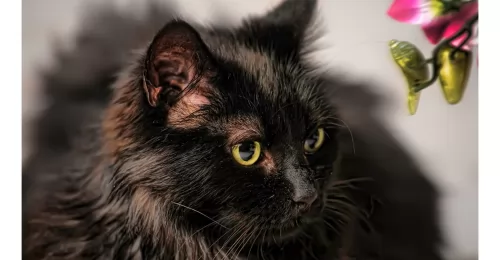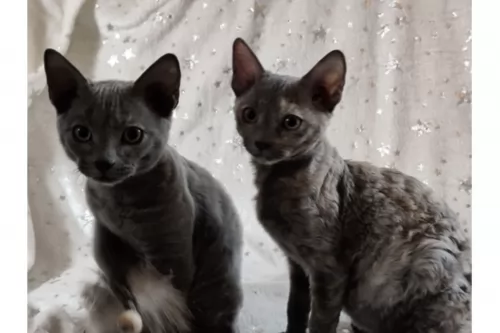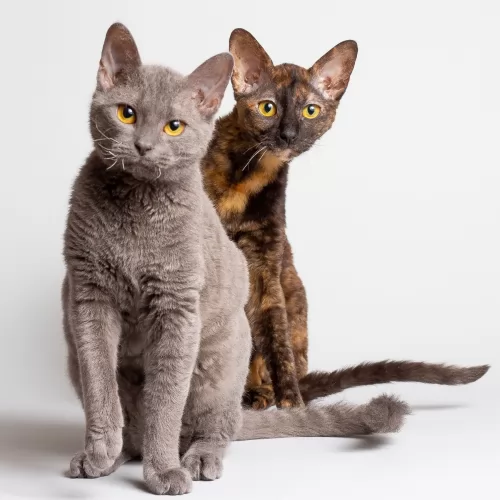 Petzlover
Petzlover Chantilly/Tiffany is originated from United States but German Rex is originated from Germany. Both Chantilly/Tiffany and German Rex are of same weight. Both Chantilly/Tiffany and German Rex has almost same life span. Both Chantilly/Tiffany and German Rex has same litter size. Both Chantilly/Tiffany and German Rex requires Low Maintenance.
Chantilly/Tiffany is originated from United States but German Rex is originated from Germany. Both Chantilly/Tiffany and German Rex are of same weight. Both Chantilly/Tiffany and German Rex has almost same life span. Both Chantilly/Tiffany and German Rex has same litter size. Both Chantilly/Tiffany and German Rex requires Low Maintenance.
 The beautiful Chantilly/Tiffany cat gets people thinking the cat is a semi-longhaired Burmese, but of course, it's not.
The beautiful Chantilly/Tiffany cat gets people thinking the cat is a semi-longhaired Burmese, but of course, it's not.
The way the Chantilly came about was that there were a pair of chocolate-colored cats but their origins were unknown. The first litter of Chantilly kittens was born in New York in 1969 and people were so taken up by the beautiful kittens that a breeding program was started.
The cat was first started as a foreign longhair and then it changed to Tiffany. In a British registry, a cat breed that was a cross between a Chinchilla Persian and a Burmese was named the Tiffanie and renamed Chantilly and referred to as the Chantilly/Tiffany.
The breed is recognized by most major cat registries.
 The cat originates from Germany and was developed in about the 1950s. Dr. Rose Scheuer-Karpin found a frizzy-haired black and white cat and chose to breed her.
The cat originates from Germany and was developed in about the 1950s. Dr. Rose Scheuer-Karpin found a frizzy-haired black and white cat and chose to breed her.
So as to fix the frizzy hair gene, it was decided to mate the cat further and this was the start of the German Rex.
It was later crossed with the Cornish Rex. The cats were recognized by the International Feline Foundation, but the Cat Fanciers' Association still associates the breed with the Cornish Rex.
 The cat has a fairly broad head with widely spaced ears of medium size. The eyes are oval-shaped and gold in color. The fur is semi-long and there is no undercoat. The tail is plumed.
The cat has a fairly broad head with widely spaced ears of medium size. The eyes are oval-shaped and gold in color. The fur is semi-long and there is no undercoat. The tail is plumed.
Apart from the original chocolate brown of the cat, other colors of the coat can include fawn, cinnamon, black, lilac and blue, with the chocolate brown being the favorite color.
The Chantilly promises to be a devoted and loyal feline companion for you, much preferring the company of his human family than to being alone.
It gets on well with other pets in the house as well as with respectful, gentle children. He isn't a demanding cat and he tries to talk with his family by chirping. It’s a balanced cat, with a fair share of docility and energy, making the cat an ideal companion for single people, couples, families, and elderly people.
It’s a cat that is so devoted, it will follow his human family around the house.
 This is a medium-sized, muscular domestic cat with a well-developed chest. The cat can weigh between 3 and 6kg.
This is a medium-sized, muscular domestic cat with a well-developed chest. The cat can weigh between 3 and 6kg.
The legs are fairly long and slender but strong and the tail is thick and furry with a rounded tip. The head is round and the ears are large. The eye colors are always related to the coat color. The coat is short and silky and in many colors and it has a tendency to curl.
These are friendly cats that form a strong bond with their human owners, although they are friendly towards strangers too.
They’re intelligent, lively, and playful too and will fit in well to homes with children.
Because of their playful nature, you want to ensure you provide them with lots of entertaining, stimulating toys.
They’ve got balanced personalities and are known for being sociable, adapting to the lifestyles they find themselves in. They will also get on well with other pets in the home, and enjoy being both indoors and outside.
 The Chantilly/Tiffany is a gentle and kind breed that is playful and easy-going. They are just your typical middle-of-the-road cats that are not too much or too little of anything.
The Chantilly/Tiffany is a gentle and kind breed that is playful and easy-going. They are just your typical middle-of-the-road cats that are not too much or too little of anything.
The Tiffany is playful, docile, happy and content and he wants to be your friend and companion.
If you are looking for a breed of cat that is loyal to its human family, allow this cat into your home... you won't have any regrets.
 Your German Rex is everything you want in a pet. He is a cat that loves his human family and is prepared to offer loyalty and love in exchange for the same.
Your German Rex is everything you want in a pet. He is a cat that loves his human family and is prepared to offer loyalty and love in exchange for the same.
He is adaptable and undemanding. Before you invest in such a cat, understand that interaction from you is highly important, so if you don’t have time for an adult pet, it would be kinder not to get this particular cat breed as they crave lots of attention,
 There is no health issue that the Tiffany is prone to. Like any cat, a healthy diet will keep the Tiffany healthy for years.
There is no health issue that the Tiffany is prone to. Like any cat, a healthy diet will keep the Tiffany healthy for years.
These cats are known to have delicate digestive systems so avoid foods with grain if possible. The Tiffany has full hair in their ears, and wax build-up can occur so the inside of his ears must be checked. Checking the ears once a week, as part of a regular routine that includes brushing, and tooth care, should be sufficient to keep the ear canals clear.
Other issues, which are not detrimental but should be kept in mind, are reports that the Tiffany has delicate digestion. This cat relies on a regular diet that doesn't chop and change often.
Because the Tiffany is a low-shedding cat, it is thought to be a popular breed with those people who are allergic to cat hair.
 With excellent care and lots of love and attention, your German Rex can reach up to 17 years of age. They aren’t prone to any particular diseases, but diet plays a massive role in their health.
With excellent care and lots of love and attention, your German Rex can reach up to 17 years of age. They aren’t prone to any particular diseases, but diet plays a massive role in their health.
Remember that obesity is a major disease and it in itself can contribute to a host of other illnesses in cats and shorten its life. Excess weight contributes towards arthritis and diabetes and just losing a bit of weight can contribute towards increased mobility.
Dental disease is a common, chronic problem and you need to ensure your pet’s diet promotes dental health. It can be extremely stressful for your cat to have his teeth brushed, but in the case of chronic dental infection, get your pet to a vet.
 The Chantilly needs an excellet diet and exercise to ensure he doesn’t become to overweght. Remember that cats are carnivores, and this means they have nutritional requirements that can only be met with meat – they can never do well on a diet high in carbohydrates and will develop digestive problems. Your cat will also require clean, fresh water aroud thd clock to ensure his good health.
The Chantilly needs an excellet diet and exercise to ensure he doesn’t become to overweght. Remember that cats are carnivores, and this means they have nutritional requirements that can only be met with meat – they can never do well on a diet high in carbohydrates and will develop digestive problems. Your cat will also require clean, fresh water aroud thd clock to ensure his good health.
Ensure each cat you have has a litter box andencourae good litter box habits by cleaning th litter box every day. Keeping the litter box clean also alerts you anything unusual with your cat’s toilet habits.
Provide your cat with a scratching post and a climbing tree.
The cat doesn’t have an undercoat and is therefore easy to groom. With his semi-long hair, you can brush him once a week to keep the coat soft and shiny. The coat is also low shedding.
Check inside his ears and inside his mouth to ensure there is no redness and signs of infection.
Schedule regular vet visits for your cat for his cat vaccines and for when he is sick.
Spay or neuter your cat to prevent unwanted kittens. Spaying and neutering prevents uterine infections and certain cancers in the felines.
 The German Rex is a shorthaired breed so a gentle brush once a week will be quite adequate.
The German Rex is a shorthaired breed so a gentle brush once a week will be quite adequate.
As you groom your German Rex, feel for any unusual lumps and make sure there are no signs of sores or rashes on your cat.
Check inside his ears for wax and dirt buildup and signs of redness for infection. If you don’t like to clean the inside of your cat’s ears, there are professional cat groomers and your local vet who will do this for you.
Make sure you feed your Rex the best cat food there is. When you look at the commercially cat manufactured foods there are, you’ll notice that there is dry kibble for cats as well as wet-type foods.
Through trial and error, you’ll learn what your cat likes, but your vet can offer valuable information on what is essential in a cat’s diet. Cats are carnivores so that means their diets have to be high in meat – protein – and low in carbohydrates.
Check out the best cat foods there are – the ones that have all the vitamins and minerals your cat requires to remain healthy.
Provide your cat with a litter box and keep it meticulously clean, scooping out the cat droppings every day and changing the actual sand or grit regularly.
Provide your cat with a warm bed, food and water bowls, toys, collar, and tag, climbing tree and scratching post.
Your kitten must start their first vaccines between 8 and 12 weeks of age. Your kitten will also be dewormed.
Take your cat to the vet when he is sick.